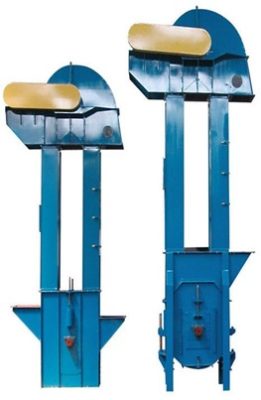Prebecc provides high-performance conveyor systems and industrial transport equipment designed to optimize production processes and enhance operational efficiency. This article will introduce various types of conveyors, including PVC belt conveyors, rubber belt conveyors, roller conveyors, chain conveyors, vertical conveyors, as well as other transport equipment such as screw conveyors and bucket elevators.
1. PVC Belt Conveyor
PVC belt conveyors are among the most commonly used conveyor systems in industrial applications, particularly in automated production lines. Featuring a simple structure, PVC conveyors come in two main surface types: smooth and textured, making them suitable for transporting a wide range of products.
These conveyors are designed with a scratch-resistant surface and excellent heat resistance, ensuring durability in continuous production environments. Additionally, PVC belts can withstand exposure to chemicals and oils, making them ideal for industries that require high durability and food safety compliance.
PVC belt conveyors are available in various colors, including green, white, and gray, depending on specific usage requirements. They maintain structural stability without stretching during operation, ensuring a reliable conveying system with minimal maintenance—ultimately reducing operational costs.
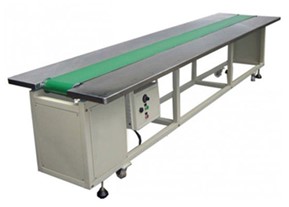
2. Rubber Belt Conveyor
Rubber belt conveyors are the optimal choice for heavy industries such as mining, cement production, steel manufacturing, and more. With excellent elasticity and high durability, rubber conveyors ensure efficient material handling while protecting products during transportation.
This type of conveyor is widely used for transporting boxed goods, packaged materials, and bulk loads, enabling continuous production while reducing time and labor costs. Additionally, rubber conveyors can withstand harsh environmental conditions, including high temperatures, chemicals, and humidity.
Depending on specific operational needs, rubber conveyors can be designed with multiple reinforcing fabric layers to enhance strength and maximize performance.
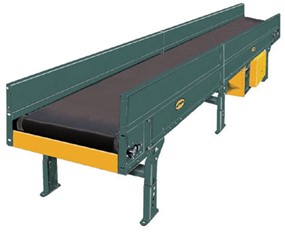
3. Roller Conveyor
Roller conveyors are an effective solution for transporting flat-bottomed and heavy products. With a simple yet robust design, these conveyors can operate manually or be motorized, depending on production requirements.
Key advantages of roller conveyors include reduced friction, energy efficiency, and improved material flow. Moreover, they offer flexible direction changes, making them suitable for various production spaces.
Roller conveyors are commonly used in warehouses, packaging lines, logistics centers, and numerous industrial applications.
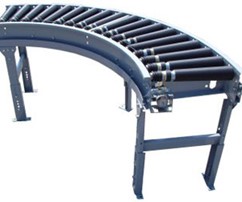
4. Chain Conveyor
Chain conveyors are specialized systems designed for transporting large, heavy, or uniquely shaped products. Their structure consists of interlinked metal chains, providing high load capacity and stable operation in demanding industrial environments.
These conveyors can be constructed from steel, stainless steel, or plastic, making them suitable for industries such as automotive manufacturing, electronics assembly, food processing, and pharmaceuticals. Their superior load-bearing capability, consistent performance, and ease of maintenance make them a standout choice in industrial applications.
.
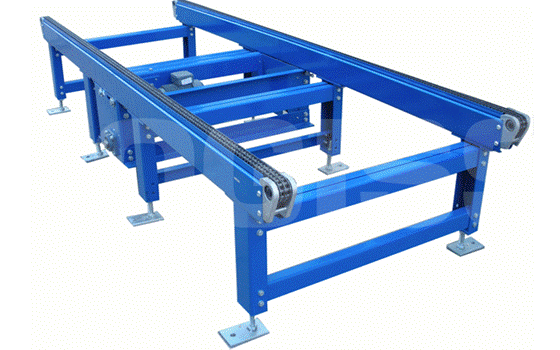
5. Vertical Conveyor
Vertical conveyors are designed for transporting goods in a vertical direction or at steep inclines. They are an ideal solution for facilities with limited space or operations requiring efficient product movement between floors.
With a compact design, vertical conveyors help maximize floor space and optimize production layouts. They are widely used in food processing, pharmaceuticals, electronics manufacturing, and industries that require vertical material handling.
These systems can also be integrated with safety sensors to monitor operation and minimize production risks, ensuring a safe and efficient workflow.
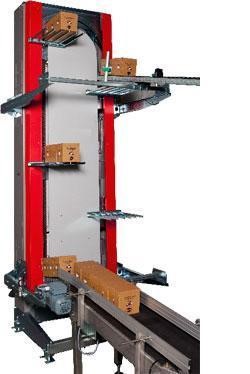
6. Other Material Handling Equipment
6.1. Screw Conveyor
A screw conveyor is a specialized transport system that utilizes a helical screw mechanism to move bulk materials such as powders, granules, cement, and animal feed. With its simple yet highly effective design, the screw conveyor ensures a continuous material flow while minimizing spillage.
These conveyors can be constructed from stainless steel or galvanized steel to resist corrosion, ensuring durability and reliability in industrial environments.
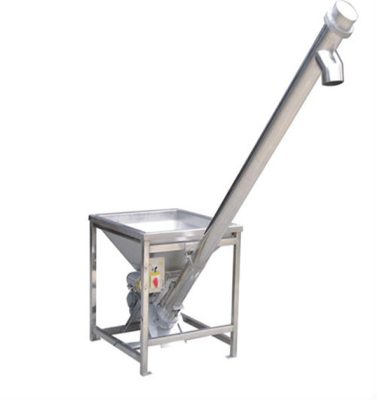
6.2. Bucket Elevator
Bucket elevators are primarily used in agriculture, food processing, and mining industries to transport bulk materials vertically with high efficiency. This system consists of multiple buckets attached to a belt or chain, enabling smooth and effective material lifting.
Key advantages of bucket elevators include high-capacity transport, energy efficiency, and minimal dust generation during operation, making them an optimal choice for clean and streamlined production processes.
